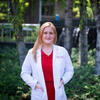What is your degree program, and can you briefly describe the chain of events that led you to graduate school at Temple?
I’m in the biomedical sciences program, which is a dual degree program. Basically what that entails is your first two years you do pre-clinical in the trenches with all the other medical students, preparing for your first board exam. After those first two years of being indoors, studying nonstop, you leave your class and enter a lab and specialty of your choosing. I first matriculated here in 2019, and 2020 was a big year for medicine— not in a good way. I was in my first year of medical school when the pandemic hit. I dedicated myself to helping wherever I could, doing manual labor, setting up different sites for overflow patients, running transportation. I would study in the day, and at night I would go to Temple University Hospital, get in the full hazmat garb, and I would move beds.
I saw firsthand that medicine is incredible, but it's very much in progress. And so to assuage that heartbreak that I think all doctors feel when there's nothing more they can do for a patient, I fell into research where we can kind of push the bounds of medicine to help patients in the future. This experience led me choosing neuroscience, which I would argue is the best cohort, and joining Dr. Khalili’s lab. Dr. Khalili is always spinning big philosophical questions about medicine and the future of medicine, and he was immediately ready to take me on as a student. I finished my PhD with him in three years, and now I'm back on clinical: Two years where I'm patient-forward, and once I've done that, I'll hopefully be in residency and I'll be a fully fledged doctor.
Can you tell us a little bit about your research?
I work in the Center for Neurovirology and Gene Editing, and I actually have an NIH grant that's specific to translational medicine, which is really cool because it means I'm working on actual therapies that we're trying to get into the patient population. I work with CRISPR gene editing, which is pretty new; it basically allows us to edit the genome of humans or, in our case, viruses, to eliminate the disease. My disease of interest is JC virus, which is a virus that pretty much all of us have, but only really affects those who have immunosuppression. There isn’t really a treatment, which is where CRISPR comes in as this extreme new field of antiviral.
Can you tell us more about your specific program? What do you like about it, and what kind of opportunities have come out of it?
The MD/PhD program is really cool because there aren’t very many of us, and every single one of us is insanely passionate about a different field. So I'm in neuroscience, there’s someone in lymphatics, someone in cardiovascular, someone in the Institute for Aging looking at calcium channel ions and how that affects Alzheimer’s, creating this wide spectrum of interests and each one of us is so, so in-depth with our research. Once a week we have grand rounds where we're presenting what we're working on, or a patient case that relates to the research we're doing. It's so rewarding. I retain that information much better than anything that I'm ever going to learn in a textbook, and it's cutting edge— things that are being published in scientific journals, not textbooks. I love my fellow MD/PhDs, and I'm really grateful for them being my teachers.
What do you consider your community at Temple?
I first matriculated as part of the class of 2023, so some of my friends that I got my white coat with are now going to be attendings that I'm rotating with, which is really nice, and they give me the inside scoop on what’s happening around the hospital. When they all matched and moved on, I found a separate community with the PhD students. The neuroscience cohort is led by Dr. Fossati and Dr. Thomas. They are so passionate, and they encourage their students to present weekly on topics outside of their field of research. So we all get together once a week and chat for an hour, whether it’s about drug abuse or brain regeneration or spinal cord injury… I think I've given like three lectures on how fish oil is going to save us all.


